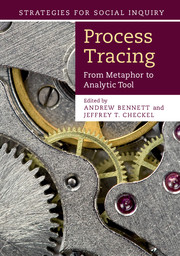Book contents
- Frontmatter
- Contents
- List of figures
- List of tables
- List of contributors
- Preface
- Part I Introduction
- Part II Process tracing in action
- Part III Extensions, controversies, and conclusions
- 8 Improving process tracing
- 9 Practice tracing
- 10 Beyond metaphors
- Appendix Disciplining our conjectures
- References
- Index
8 - Improving process tracing
The case of multi-method research
Published online by Cambridge University Press: 05 November 2014
- Frontmatter
- Contents
- List of figures
- List of tables
- List of contributors
- Preface
- Part I Introduction
- Part II Process tracing in action
- Part III Extensions, controversies, and conclusions
- 8 Improving process tracing
- 9 Practice tracing
- 10 Beyond metaphors
- Appendix Disciplining our conjectures
- References
- Index
Summary
Introduction
Social scientists increasingly champion multi-method research – in particular, the use of both quantitative and qualitative tools for causal inference. Yet, what role does process tracing play in such research? I turn in this chapter to natural experiments, where process tracing can make especially useful and well-defined contributions. As I discuss, however, several lessons are relevant to other kinds of multi-method research.
With natural experiments, quantitative tools are often critical for assessing causation. Random or “as-if” random assignment to comparison groups – the definitional criterion for a natural experiment – can obviate standard concerns about confounding variables, because only the putative cause varies across the groups. Other factors are balanced by randomization, up to chance error. Simple comparisons, such as differences of means or percentages, may then validly estimate the average effect of the cause, that is, the average difference due to its presence or absence. Controlling for confounding variables is not required, and can even be harmful.
However, much more than data analysis is needed to make such research compelling. In the first place, researchers must ask the right research questions and formulate the right hypotheses; and they must create or discover research designs and gather data to test those hypotheses. Successful quantitative analysis also depends on the validity of causal models, in terms of which hypotheses are defined.
- Type
- Chapter
- Information
- Process TracingFrom Metaphor to Analytic Tool, pp. 211 - 236Publisher: Cambridge University PressPrint publication year: 2014
- 6
- Cited by



